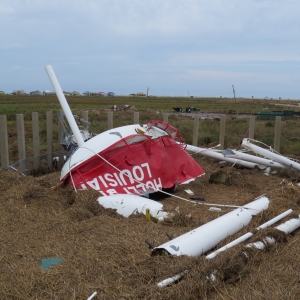The Stream, September 16, 2020: Chicago Mayor Commits to Removing All Lead Pipes From City
The Global Rundown
The mayor of Chicago has released a plan to eliminate the city’s lead pipes. A new report includes water recommendations to the next U.S. president. Hurricane Sally is set to make landfall along the U.S. Gulf Coast. Nigeria faces a food crisis due to flooding and food shortages. Farmers in Mexico have occupied a local dam to stop water payments to the United States.
“We tried to have a dialogue, but nobody listened to us. There are thousands of farmers desperate for water. We have had no rain in months and there will be nothing left for the spring crops.” – Guerrero Carillo, a Mexican farm leader. Violence erupted this month in Mexico City when about 2,000 protesters seized control of the La Boquilla dam on the Conchas River to dramatize the plight of farmers whose cotton, tomato and pecan crops, they say, depend on the water that’s being sent into the United States. Unrest has simmered for months over U.S. demands that Mexico pay off a shortfall of more than 100 billion gallons of water they owe to irrigate farms along the border under a treaty signed during World War II. Tensions escalated after a national guard unit was sent in to stop the protesters and one woman was shot dead on Tuesday. Generators at the dam were set on fire, causing a power blackout, which federal security officials called “sabotage and sedition.” Carillo rejected other allegations that the protesters were being led by outsiders or were targeting fellow farmers and said the surge of popular support gave the protesters courage. The Washington Post
Latest WaterNews from Circle of Blue
‘A Lot of Catastrophe’: Louisiana Water Systems Still Reeling from Hurricane Laura – Nearly three weeks after the Category 4 storm, more than 30 water systems in the state are still not operating.
Thirsting for Solutions – Across the U.S., aging infrastructure, legacy pollution and emerging contaminants are creating a growing urgency to pay attention to the quality of the water we drink. This story was co-published with Ensia, a solutions-focused nonprofit media outlet reporting on our changing planet.
Western Wildfires Damage, Contaminate Drinking Water Systems – As they tear through forests and developed areas, fires in California, Oregon and Washington have destroyed water infrastructure and released chemical contaminants.
By The Numbers
55 The number of miles Hurricane Sally was east of the mouth of the Mississippi River, as of Tuesday morning. The storm is inching closer to the Gulf Coast, threatening to bring possible historic flooding and “extreme life-threatening” flash flooding, according to forecasters. Authorities along the U.S. Gulf Coast are shutting down some roadways and residents are clearing out or hunkering down. The storm is expected to make landfall Tuesday night or Wednesday morning in the hurricane warning area, which stretches from east of Bay St. Louis, Mississippi to Navarre, Florida. CBS News
400,000 The number of lead pipes set to be removed in Chicago, according to a new plan from Mayor Lori Lightfoot. The mayor said her team is still gathering information on the cost of the lead line replacement program but estimated the city could spend about $8.5 billion on the project. Removing all lead lines in Chicago could take decades, and the city is depending on state and federal grants to fund most of the program. The city didn’t stop installing lead lines until 1986 and today is home to the nation’s largest counted inventory of lead service lines. WBEZ
Science, Studies, and Reports
The Pacific Institute has released a set of water recommendations to the next President of the United States. The report begins by outlining the nation’s water challenges, such as access to safe water and climate change. Recommendations in the report include supporting programs that require the removal of all lead pipes, improving water efficiency for urban and agricultural users and restoring and expanding public access to science and water-related data from governmental agencies. Pacific Institute
On the Radar
Floods and food shortages may thrust Nigeria into a food crisis. The twin crises come just after movement restriction and financing difficulties caused by Covid-19 containment measures complicated spring planting. Problems accessing foreign exchange to import food are adding to shortages. Last week, even as food prices spiked, President Muhammadu Buhari promised the central bank wouldn’t spend money on food or fertilizer imports, as Nigeria would continue encouraging local farmers instead. One farmer said while he believes the president’s intentions were good, he fears local production won’t be able to sustain the population of Nigeria. Al Jazeera
Jane is a Communications Associate for Circle of Blue. She writes The Stream and has covered domestic and international water issues for Circle of Blue. She is a recent graduate of Grand Valley State University, where she studied Multimedia Journalism and Women, Gender and Sexuality Studies. During her time at Grand Valley, she was the host of the Community Service Learning Center podcast Be the Change. Currently based in Grand Rapids, Michigan, Jane enjoys listening to music, reading and spending time outdoors.






Leave a Reply
Want to join the discussion?Feel free to contribute!